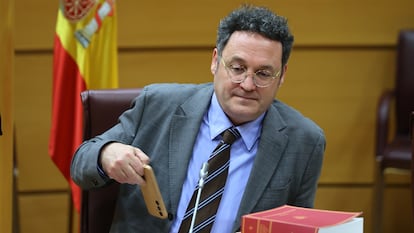The judge reproaches the attorney general for having made “evidence that could incriminate him disappear”



Madrid - CET
Magistrate Ángel Hurtado, the investigating judge in the case for disclosure of secrets opened to the Attorney General of the State, has issued an order this Tuesday in which he establishes that from now on the annexes of the official letters issued by the Central Operative Unit (UCO) of the Civil Guard will not be delivered to the parties involved, but will remain at their disposal for consultation in the court's office. In the document, Hurtado reproaches Álvaro García Ortiz for having made "evidence disappear that could incriminate him in reference to the deletion of the messages that Álvaro García Ortiz made after being indicted for disclosure of secrets. The investigating judge admits that the deletion of the phone "has no criminal relevance", but warns that "it should not be ignored that it has no impact on the development of a criminal investigation".
This is the first time that the judge has spoken out about García Ortiz's decision to change or delete the content of his mobile phone when he was already being investigated for revealing secrets. In his statement before the judge as a suspect on January 29, García Ortiz said that he has changed his phone six times in the four years he has been at the head of the Attorney General's Office and that he usually deletes content from his phone for security reasons and because it is "a legal obligation", since it contains sensitive information that affects a multitude of criminal investigations and state institutions.
The instructor, as he suggests in Tuesday's ruling, does not believe this explanation and accuses the attorney general of not cooperating with justice: “It is evident that the person under investigation has made evidence that could be found on his mobile terminals disappear, and, although he has given different explanations for doing so, if he had shown any degree of collaboration with the clarification of the facts, he could have communicated this before carrying out such disappearance, and not take advantage of the opportunity to do so on October 16, 2024, when it is well known that this Supreme Court declares itself competent to hear the case, following the ruling of October 15.”
[Breaking news. There will be an extension soon]
Do you want to add another user to your subscription?
If you continue reading on this device, it will not be possible to read on the other device.
ArrowIf you want to share your account, change your subscription to Premium mode, so you can add another user. Each one will access with their own email account, which will allow you to personalize your experience at EL PAÍS.
Do you have a business subscription? Click here to purchase more accounts.
If you don't know who is using your account, we recommend changing your password here.
If you choose to continue sharing your account, this message will be displayed on your device and the device of the other person using your account indefinitely, affecting your reading experience. You can check the terms and conditions of the digital subscription here.

Editor covering information from the Supreme Court, the General Council of the Judiciary and other areas of justice. She has spent most of her career at EL PAÍS, where she has been a local news editor in Seville, a correspondent in Granada and has held various social portfolios. She has a degree in Journalism and a Master's degree in Journalism from EL PAÍS.
EL PAÍS







